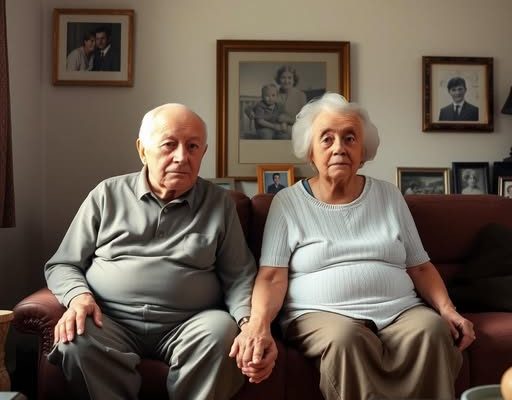All our lives, everything was for the kids. Not for ourselves. Not for comfort. Just for them — our three darlings who we cherished, spoiled, and sacrificed every single thing for. And who would’ve thought that after all of it — after the years of scraped knees and bedtime stories and hand-sewn Halloween costumes — we’d be repaid with silence.
John and I were childhood sweethearts, neighbors who grew up on the same street, went to the same schools. We married young — eighteen — with nothing but hope and each other. The wedding was small, simple. A few months later, I found out I was pregnant. John dropped out of university and threw himself into work, juggling two jobs just to keep us afloat.
We were poor. Sometimes there was nothing but baked potatoes and thin soup on the table, but we never complained. Every sacrifice felt worth it — because we dreamed of a life where our children would never know what we knew of struggle. When I got pregnant with our second, there was fear, yes. But doubt? Never. We carried on. We always carried on.
We had no help. No grandparents to babysit, no siblings nearby. My mother passed too young. John’s mother had her own life and barely visited. It was just us — and the children. John worked himself to exhaustion. I lived between the stove and the nursery. No holidays, no luxuries. But plenty of laughter. Plenty of love.
And then came our third — our youngest, Emily. More bills, more loans. Still, we never said no. When she dreamed of becoming a doctor, we didn’t hesitate. We sold half of what we owned, drained every penny of our savings, took out another loan to send her abroad to study. “We’ll manage,” we told ourselves. We always managed.
The years passed quickly, as years tend to do. And before we knew it, the house was quiet. The kids grew up, flew off, started lives of their own. And then old age arrived like a thief in the night, without mercy or grace. First, John’s health began to fail — the diagnosis hit like a freight train. I became his nurse, his cook, his caretaker. Alone.
I called our eldest, Sophie. I begged her to visit.
“I have my own kids, Mom. My own life. You can’t expect me to drop everything.”
A friend saw her later that week — laughing at a café with her friends.
Our son, James? He said work had him drowning. That same evening, he posted vacation photos from Ibiza, cocktail in hand, tan glowing.
And Emily, our youngest — the one we poured everything into? She simply texted: “Can’t leave during exams. Sorry.”
And that was that.
At night, I would sit by John’s bed, spoon-feeding him warm broth, wiping his forehead when pain gripped him. I whispered prayers as his breath rattled. I didn’t expect them to perform miracles — I just wanted someone to care. To show up. To sit with us.
But no one came.
The bitter truth sat with me in those quiet hours: we had become invisible. All our sacrifices, our choices — they were ancient history. Our usefulness had expired. They had their bright futures; we were relics they’d rather not look at.
Sometimes I’d hear neighbors laughing in the hallway — grandchildren visiting. I’d hear my old friend Margaret’s daughter arriving with flowers. I’d rush to the door at the sound of footsteps, heart pounding — hoping. Always hoping. But it was never them.
And then one grey November morning, John was gone. He squeezed my hand softly, whispered, “You did good, Nora,” and drifted away.
He deserved more than just me by his side.
No rushed flights. No tearful goodbyes. No flowers from the children who once clung to his legs, begging for bedtime stories. Just me. And the hospice nurse who cried harder than any of them.
For two days, I couldn’t eat. Couldn’t even bring myself to put on the kettle. The house felt so heavy — like a weight pressing into my chest. His side of the bed remained untouched. The silence was louder than grief.
I stopped locking the door. Not because I forgot. Not because I hoped someone might come. But because… I simply didn’t care anymore.
Then, one late afternoon, as Judge Rina mumbled on the television, I heard a quiet knock. And then, “Hello?”
I turned, startled. A girl stood in my doorway. Early twenties, dark curls, an oversized hoodie swallowing her frame. She looked lost.
“I’m sorry — I think I’ve got the wrong flat,” she said.
I could have just closed the door. But I didn’t.
“Would you like a cup of tea?”
She blinked at me, surprised. “Uh… sure.”
Her name was Yara. She’d just moved into the building after being kicked out by her stepfather. She worked nights at the supermarket. She was tired. Lonely. Invisible.
“I know that feeling,” I told her.
She visited often after that. Sometimes with banana bread she claimed was barely edible. Sometimes with puzzles she found at charity shops. She’d sit with me, asking about John, laughing at my stories. She even fixed the dripping kitchen tap one afternoon without being asked.
Then on my birthday — the one my children forgot — she knocked at the door holding a tiny cake with messy icing: “Happy B-Day Nora!”
I cried. Not for the cake. For being remembered.
That same night, Emily finally messaged me: “Sorry for being out of touch. Hope you’re doing okay.” No call. No visit. Just that.
And you know what? I didn’t feel crushed. I felt… free.
Free from hoping they would change. Free from waiting.
I stopped chasing.
I started walking again. Signed up for ceramics. Grew basil on the windowsill. Some evenings, Yara would join me for dinner. Other times she wouldn’t. That was okay. She showed up when it mattered.
And then one day, a plain envelope arrived in the mail. No return address.
Inside was a photo — an old one of us at the beach: John, the kids, sunburnt and smiling. Tucked behind it was a small scrap of paper with only three words: I’m so sorry.
I didn’t recognize the handwriting. Maybe it was Sophie. Maybe it wasn’t.
I placed the photo on the mantle, next to John’s old key dish, and whispered softly, “I forgive you.”
Because here’s the truth no one tells you: being needed is not the same as being loved.
We spent a lifetime being needed. It’s only now, in this quiet chapter, that I’m learning what love actually looks like. It’s not obligation. It’s not duty. It’s choosing to show up — even when you don’t have to.
If you’re reading this and you feel forgotten — please know: your story isn’t over. Sometimes love shows up wearing an oversized hoodie, not a perfect family card. Leave the door open. Not for who you lost, but for who might still find you.
❤️ If this touched you, share it with someone who might need to hear it. You never know who’s waiting to feel seen.



